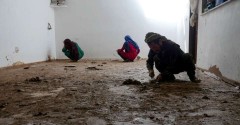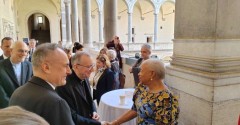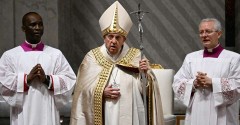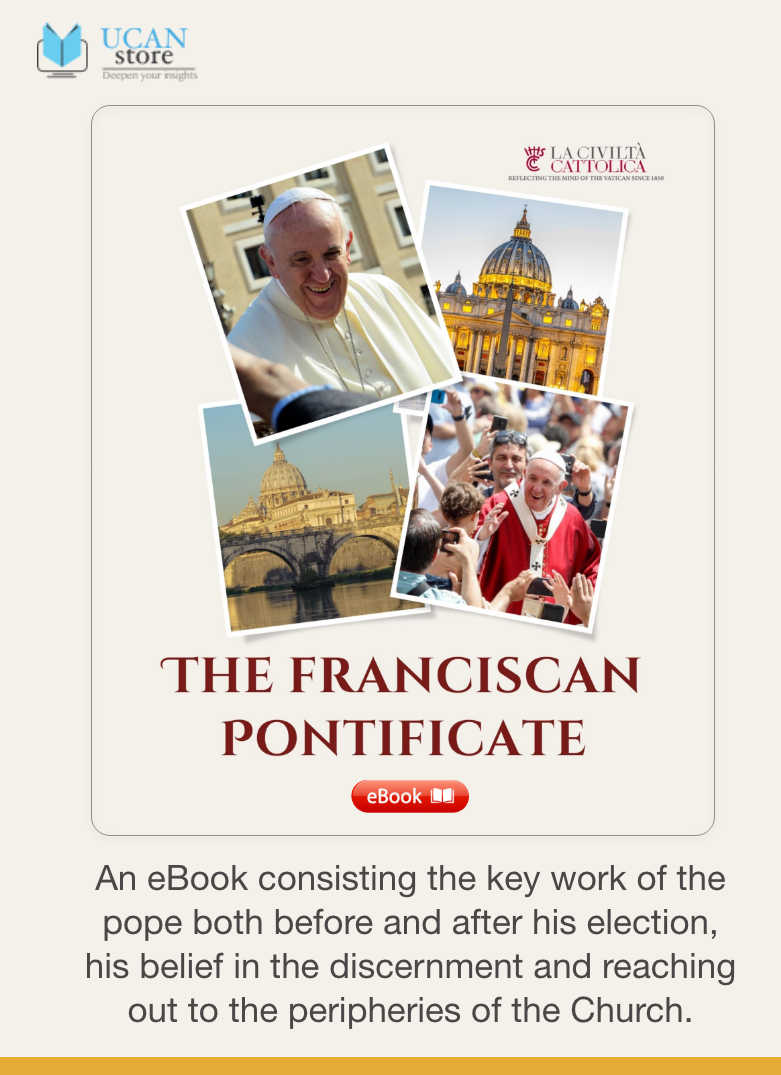
NEWSLETTERS
What’s happening in Asian Church
and what does it mean for the
rest of the world?
Updated: August 14, 2023 07:34 AM GMT
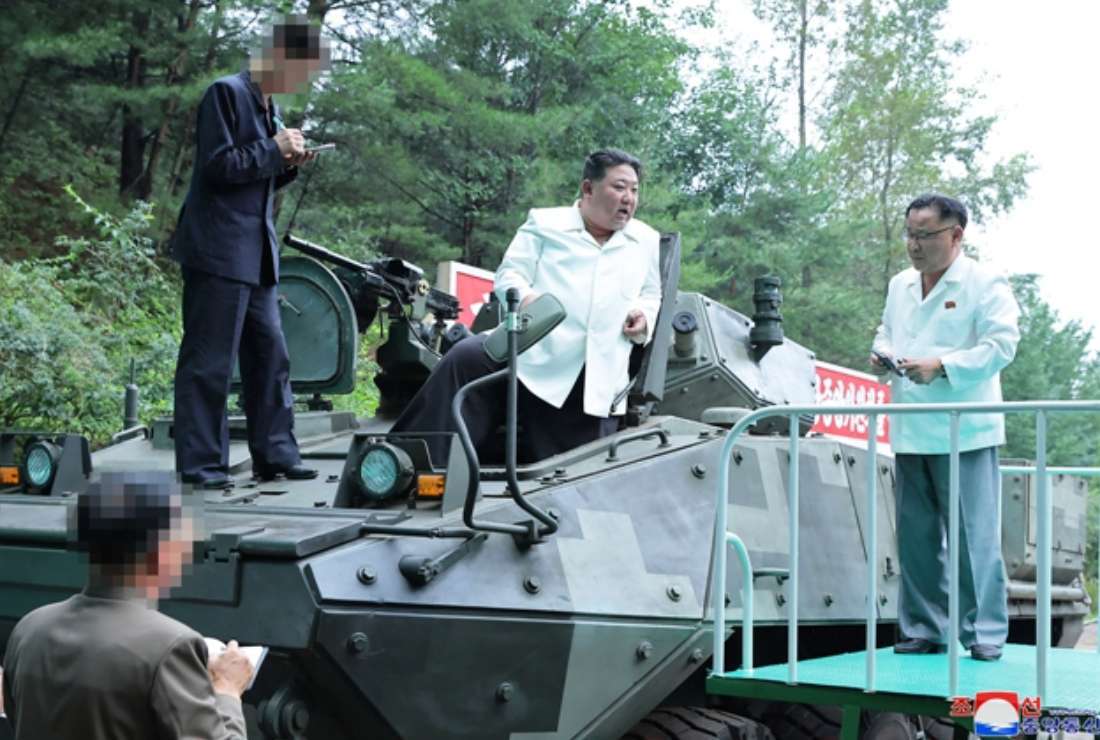
This undated photo released from North Korea's official Korean Central News Agency (KCNA) on Aug. 14 shows North Korea's leader Kim Jong-un (center) on a multi-purpose armored vehicle after a visit to an important munitions factory at an undisclosed location in North Korea. (Photo: KCNA via KNS / AFP)
The inhumanity, barbarity and criminality of Kim Jong-un’s regime in North Korea are well-known. Its kleptomania is equally well-documented. It is perhaps the only regime in the world which is both a dynasty and, according to its propaganda, expects to be worshipped as a deity.
In its edicts to the people of North Korea ahead of tropical storm Khanun, it has reminded the world of its cruel narcissism taken to the extreme.
Late last week, it was reported that North Koreans had been instructed to do everything possible to protect portraits of the Kim family in the face of the storm’s strong winds and heavy rain.
The ruling Korean Workers’ Party regime’s official newspaper, The Rodong Sinmun, said that the “foremost focus” of North Korean people should be on “ensuring the safety” of portraits of Kim Jong-un, his father Kim Jong-il and his grandfather, the country’s founder, Kim Il-sung.
Their “foremost focus” is not ensuring shelter, food and medical care for children, the sick and the elderly. Not safe evacuation from the storm. Not battening down the hatches to protect their homes. No. Above all else, they must protect portraits of the ruling family.
This sums up the ideology of the regime that has ruled the world’s most closed nation — known as the “hermit kingdom” — for three-quarters of a century. And it is the latest in a litany of crimes over the past 75 years for which one day the Kim regime will be held to account.
It is therefore timely — if long overdue — that the United Nations Security Council will discuss the human rights crisis in North Korea this week, for the first time since 2017.
Ten years ago the UN Human Rights Council established a Commission of Inquiry to investigate North Korea’s human rights record, chaired by the distinguished Australian judge Justice Michael Kirby. The commission’s report, published in 2014, concluded that the “gravity, scale and nature” of the violations of human rights in North Korea “reveal a State that does not have any parallel in the contemporary world.”
The inquiry documented a catalogue of crimes against humanity, including “extermination, murder, enslavement, torture, imprisonment, rape, forced abortions” as well as severe religious persecution, enforced disappearances, and starvation, which should lead, it recommended, to a referral to the International Criminal Court (ICC).
Ten years on, what has happened? Nothing.
For a few years, North Korea was regularly discussed at the Security Council, and a UN field office was opened in Seoul to continue the work of documenting violations, but no efforts toward accountability were pursued. The commission’s report stayed, as I feared and warned it might, gathering dust on a shelf.
That in itself is a tragedy. So many people went to great efforts to secure and then contribute to the Commission of Inquiry, against the odds.
The organization I work with, Christian Solidarity Worldwide (CSW), was one of the first to document North Korea’s human rights crisis in its 2007 report North Korea: A Case to Answer, A Call to Act. We were among the very first to call for a UN inquiry.
Indeed, initially, many people dismissed our recommendation for such an inquiry, saying it could never happen. But by 2011, other human rights groups were beginning to make the same call for accountability and an end to impunity.
And so together with a few others — including the three largest human rights organizations in the world, Human Rights Watch, Amnesty International and the Paris-based International Federation of Human Rights (FIDH) — we formed a coalition of over 40 groups from across the world, which was launched in Tokyo as the International Coalition to Stop Crimes Against Humanity in North Korea (ICNK).
From there, momentum grew rapidly. Over the subsequent 18 months or so, the UN High Commissioner for Human Rights at the time, and the then UN Special Rapporteur for human rights in North Korea, backed our call for an inquiry. One by one member states came out in support.
And in 2013, the Human Rights Council did what the naysayers said would never happen — they established a Commission of Inquiry on North Korea.
Justice Michael Kirby invested an extraordinary amount of personal energy, capacity and reputation in this effort. Together with UN Special Rapporteur Marzuki Darusman, a former Indonesian attorney-general, and Serbian human rights expert Sonja Biserko, they held hearings around the world, in Seoul, Tokyo, Washington, DC, and London, with over 80 victims, witnesses and experts. Almost all of the evidence sessions are still available for public viewing.
It is now time, 10 years on, to take the report off the shelf, dust it off and review the evidence and recommendations and finally act upon them.
There was hope US President Donald Trump’s unorthodox approach and his meetings with Kim Jong-un might lead to a breakthrough. But he appeared to leave out North Korea’s human rights crisis in his dialogue with Kim.
Lord Alton and Baroness Cox had the right approach — putting human rights at the heart of the engagement effort — but they were not backed up by the resources of government required for delivery. Veteran North Korean human rights expert David Hawk got it right in his 2010 report Pursuing Peace While Advancing Rights: The Untried Approach to North Korea but few policymakers have listened.
For too long, politicians and policy-makers have buried their heads in the sand and ignored North Korea; taken the punitive approach of sanctions without exploring any complementary creative options; or attempted to engage while ignoring the human rights crisis.
It’s been either all carrot, which Pyongyang has snatched and given nothing in return; all stick, wielded half-heartedly; or a “close your eyes and hope it will go away” approach.
It is time for a new approach and one that has accountability at its heart.
It is now time to bring North Korea’s forgotten but unparalleled human rights tragedy back to the international agenda. That is why the UN Security Council discussion this week is a welcome step.
I remind the international community of an article I wrote in The Wall Street Journal, just before the launch of the ICNK, headlined “Calling for Action on North Korean Crimes”. As I travel to Seoul next month for an ICNK conference, and as Kim reminds the world of his shocking inhumanity by protecting his portraits in the midst of a natural disaster, I am still calling.
*The views expressed in this article are those of the author and do not necessarily reflect the official editorial position of UCA News.









